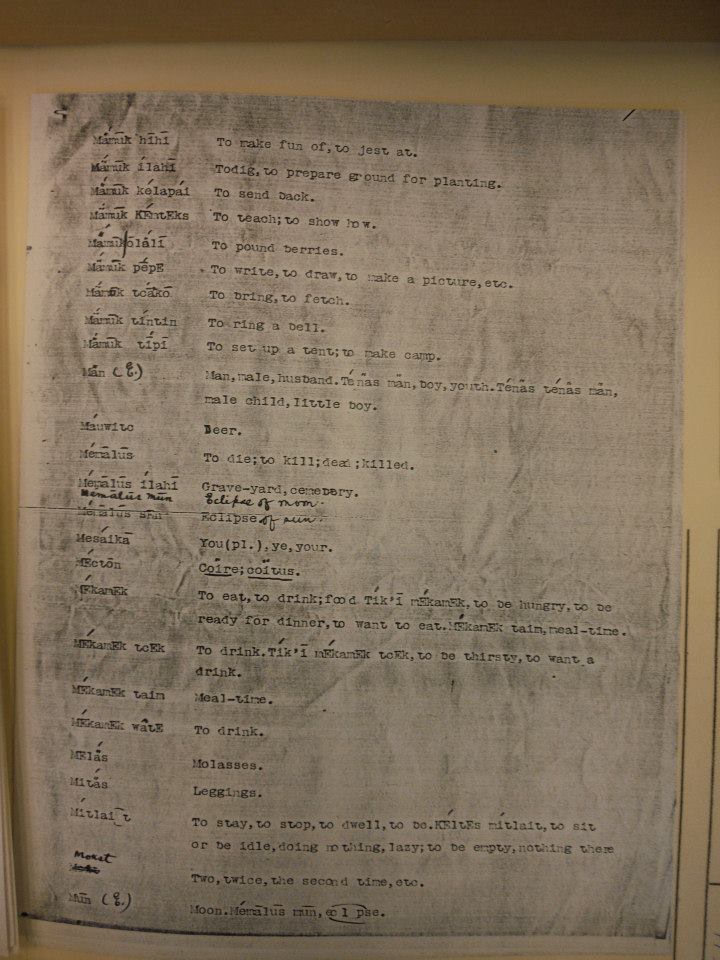AF Chamberlain’s field notes of Chinuk Wawa from SE British Columbia (Part 9: making camp,pounding berries, coïtus, little boy)
There are a number of discoveries in this 9th installment of our look at Alexander Francis Chamberlain’s field documentation of the Northern Dialect of Chinook Jargon.
What language does mÉctōn ‘coïre; coïtus’ (having sex) come from? Cree? Ktunaxa?
Chamberlain’s “c” is the “sh” sound, and his “tc” is the “ch” sound. His “ä” is the “a” in “cat”, a frequent sound in the Northern Dialect.
Stuff in orange here seems like new discoveries to me — different from what we’ve found in other places’ use of Chinuk Wawa.
(A link to all installments in this mini-series!)

- mä́mūk hīhī ‘to make fun of, to jest at’
- mä́mūk ílahī ‘to dig, to prepare ground for planting’
- mä́mūk kélapái ‘to send back’
- mä́mūk kÉmtEks ‘to teach; to show how’
- mä́mūk ōlä́lī ‘to pound berries’
This would be ‘harvest berries’ in other areas, but it’d be understood in the context of processing berries (to be dried). - mä́mūk pḗpE ‘to write, to draw, to make a picture, etc.’
In the Kamloops area, this is pretty exclusively ‘write’. - mä́mūk tcā́kō ‘to bring, to fetch’
- mä́mūk tíntin ‘to ring a bell’
- mä́mūk tī́pī ‘to set up a tent; to make camp’
We’ve previously seen tipi (‘teepee’) in Chamberlain’s notes. - män (E[nglish].) ‘man, male, husband’
- ténäs män ‘boy, youth’
- ténäs ténäs män ‘male child, little boy’
A new phrase to me!
- máuwitc ‘deer’
- mémālūs ‘to die; to kill; dead; killed’
- mémālūs ílahī ‘grave-yard; cemetery’
- mémālūs mūn ‘eclipse of moon’
Apparently a new find for us. - mémālūs sEn ‘eclipse of sun’
This one is ‘evening’ in Kamloops-area Chinook Jargon. - mesáikā ‘you (pl.), ye, your’
- mÉctōn ‘coïre; coïtus’
- mÉkamEk ‘to eat, to drink; food’
- tík’ī mÉkamEk ‘to be hungry, to be ready for dinner, to want to eat’
What’s interesting about this is to see folks not saying the common word olo ‘hungry; thirsty’. - mÉkamEk taim ‘meal-time’
The occurrences of taim in Chamberlain’s notes corroborate its frequent usage in the Kamloops area.
- tík’ī mÉkamEk ‘to be hungry, to be ready for dinner, to want to eat’
- mÉkamEk tcEk ‘to drink’
- tík’ī mÉkamEk tcEk ‘to be thirsty, to want a drink’
What’s interesting about this is to see folks not saying the common word olo ‘hungry; thirsty’.
- tík’ī mÉkamEk tcEk ‘to be thirsty, to want a drink’
- mÉkamEk taim ‘meal-time’
A repeated entry. - mÉkamEk wâtE ‘to drink’
We do find traces of wata from English in other areas’ Chinook Jargon, but it’s rare there. - mElä́s ‘molasses’
- mitä́s ‘leggings’
- mítlait ‘to stay, to stop, to dwell, to be’
- kÉltEs mítlait ‘to sit or be idle, doing nothing, lazy; to be empty, nothing there’
- mokst ‘two, twice, the second time, etc.’
- mūn ‘moon’
- mémālūs mūn ‘eclipse’
Another repeated entry.
- mémālūs mūn ‘eclipse’
